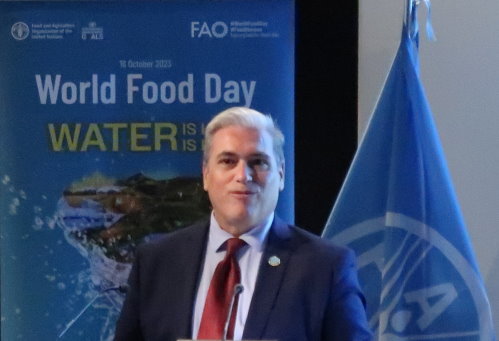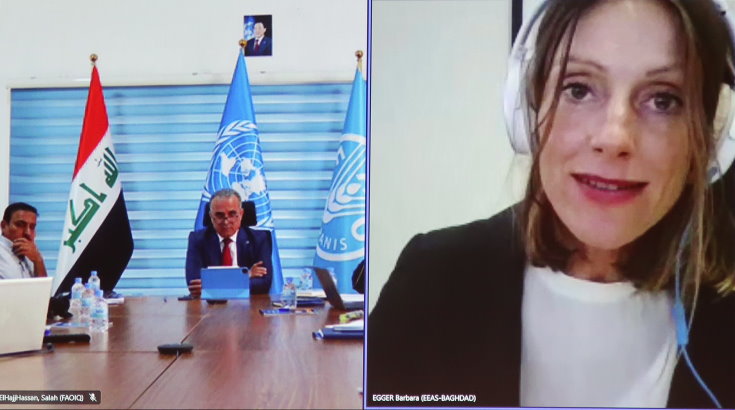 We produce globally enough food for all humans on the shared planet. Yet, according to latest estimates by the World Food Programme (WFP), conflicts, economic shocks, climate extremes and soaring fertilizer prices are combining to create a food crisis of unprecedented proportions. As many as 783 million people are facing chronic hunger. Europe has been active in supporting the fight against food insecurity and more, both short-term through ECHO and more long-term, primarly with FAO, WFP and other UN agencies. This was the backdrop for the FAO Office in Brussels headed by Raschad Al-Khafaji to invite to a gathering into the Royal Belgian Institute of Natural Sciences in Brussels on this year's World Food Day. The motto was: 'Water is life, water is food. Leave no one behind' in recognition that some 70% of all accessible freshwater resources go into food production.
We produce globally enough food for all humans on the shared planet. Yet, according to latest estimates by the World Food Programme (WFP), conflicts, economic shocks, climate extremes and soaring fertilizer prices are combining to create a food crisis of unprecedented proportions. As many as 783 million people are facing chronic hunger. Europe has been active in supporting the fight against food insecurity and more, both short-term through ECHO and more long-term, primarly with FAO, WFP and other UN agencies. This was the backdrop for the FAO Office in Brussels headed by Raschad Al-Khafaji to invite to a gathering into the Royal Belgian Institute of Natural Sciences in Brussels on this year's World Food Day. The motto was: 'Water is life, water is food. Leave no one behind' in recognition that some 70% of all accessible freshwater resources go into food production.
An interesting line-up of speakers placed the emphasis on what we know needs to be done to work towards food security for all and to showcase examples of what is being done. Myrto Arvaniti, Head of Marketing and Communication, FAO Liaison Office with the European Union and Belgium, moderated the session.

Here we can share only a few impressions from the varied programme when trying to face the stark contrasts between waste on the one hand and scarcity on the other, between greater need than ever for international cooperation and conflicts that aggravate the already harsh effects of climate change. What was visible across the evidence and case material presented was that poor and politically invisible groups of people or those believed to be government opponents were at the highest risk from food insecurity and hunger. And given the large numbers and often poor cooperation, it was increasingly difficult to manage food supplies in almost permanent emergency mode as UN Secretary General Guterres had clearly denounced.
Meike van Ginneken, the Dutch water envoy, with considerable experience in water management at home and abroad, underscored that images from the Copernicus system allowed to monitor crop developments from space even in remote areas. That allowed to anticipate better where there would be regional shortages that needed to be made up for by trade or food aid. Such imagery could also support territorial planning for making judicious use of water resources for agriculture. She cautioned that more than technology was needed to restore freshwater stocks depleted by overabstraction and drought. She reminded the audience that while much emphasis was placed on irrigation, most of the food production depended on soil moisture and rainfeed agriculture relying on 'green' water.

She did not mince her words criticising that plenty of subsidies were still being dished out in different countries and regions for types of agriculture that were making climate change worse. Given the weight of agriculture in global CO2 budgets this was a very serious concern. She called for reforms of agricultural governance, a hard look at what should attract investment, what should be taxed and what may still need to be subsidised to face global change.

Barbara Egger of the European External Action Service (EEAS) office in Baghdad joined her FAO colleague, Salah Haj Hassan, on short notice to illustrate some field activities with thousands of affected in the north and south of Iraq, the fifth most vulnerable country to climate change and water shortages.
The pictures from field conditions and work on early warning, disaster preparedness in Senegal and Cameroon brought home the pervasiveness of the message for both droughts and floods. Few people in Europe may be well informed about the devastating floods in Cameroon that had forced some two million people out of their homes experiencing extreme hardship. So, in addition to mobilising humanitarian aid it was imperative to implement multi-risk approaches and preparatory measures to attentuate impending desasters.
Following the closing remarks of UN Representative Camilla Brückner the children's choir of the British School in Brussels gave an emotional boost to all participants with their hopeful songs for water for all on the one planet we share not only with fellow humans, but all non-human life that is essential for life and food for all. In the face of so much hardship presented - think also of the victims of the earthquakes in Afghanistan - one can have ambiguous feelings about a celebration in the safety of a beautiful cultural institution. Even that can be ephemeral as events in Brussels later that day confirmed. Beyond this unease mixed with hope, the occasion brings out the strong sense of our shared humanity, no matter what. That is worth celebrating, celebrating Life on our shared Blue Planet.
For more technical information check out the FAO website.









